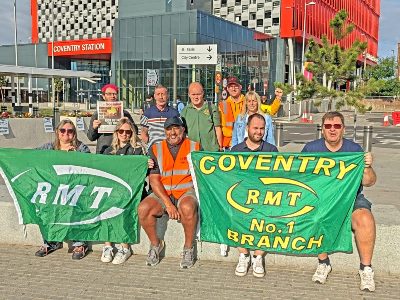
As more rail and other strikes take place, Tory Transport Secretary Grant Shapps and would-be Tory prime ministers Rishi Sunak and Liz Truss are threatening even more anti-union laws. On the campaign trail to the electorate of just 160,000 Conservative Party members, the candidates are trying to outdo each other in championing further restrictions on working people defending themselves and their families.
But it takes more than wearing a blue dress and talking about tax to recreate the spectre of Thatcher. The Tories are gnashing their teeth, precisely because they are weak, divided, and crisis-ridden, while workers are moving on to the front foot, spurred on by the cost of living spiralling out of control. But the unions must face up to the Tory threats and press home the momentum that is building up.
Over six days, upwards of 100,000 workers took national strike action across transport unions RMT, Aslef and the Communication Workers Union (CWU). This was supplemented by industrial action by another rail union, TSSA, in two rail companies and also by the increasing number of localised disputes that are growing by the week. In addition, 115,000 CWU postal workers have voted by 97.6% to strike. Many workers are winning significant victories, some before even getting to the picket line.
With inflation continuing to rise, this strike wave can continue to grow, and the unions can become a pole of attraction to workers who have their backs against the wall, including those not organised in trade unions. And the very weakness of the Tory government is giving confidence to workers that it’s possible to win.
Strikes hot up
Summer time has normally been a quiet period for the trade union movement, but there has been no winding down this year. In August, the RMT is planning to strike on London Underground and is taking two more days of national action on the railways, in which it will be joined by TSSA in 11 train operating companies, and Aslef are also going out again. In addition, the pressure of public sector workers is pushing their unions to ballot for strike action on pay after the summer.
Eleven years ago, 29 unions met at the 2011 TUC Congress to agree coordinating national strike ballots. This led directly to the N30 pensions strike that saw two million workers take action together against Tory pension attacks, in what was effectively a public sector general strike. That kind of coordination is what is needed right now, but this time the fight needs to be carried through to the end.
The National Shop Stewards Network is lobbying the TUC Congress in Brighton on Sunday 11 September around the call for the unions to strike together. But this time, the potential is even greater than in 2011. The fight for inflation-proof pay rises to protect living standards is a common one to workers across the public and private sectors. Even barristers and doctors are being forced into action.
We welcome the comments from Mick Lynch, RMT general secretary, and Labour MP John McDonnell about coordinating action. It’s clear that discussion on this is now live. In one interview, Mick Lynch reminded the interviewer that the Tory government of Edward Heath jailed trade unionists in 1972. The ‘Pentonville 5’ dockers’ release was forced because of a mass national walkout by workers that was moving towards a general strike. If the Tories proceed to try and bring in more anti-union laws, the TUC should immediately name the day for a 24-hour general strike.
Truss, in particular, is attempting to style herself on Thatcher, although the ‘Iron Lady’ wasn’t invincible and could have been defeated in the 1980s if the union leaders had mobilised to defend the miners. Ultimately, it was the mighty poll tax movement, in which Militant, the predecessor of the Socialist Party, played the key role that ended Thatcher’s reign of terror on the working class. But these present-day Tories are out of time, or they would be if the unions faced up to the situation and came together in a joint struggle.
Government of crisis
Whoever wins the Tory leadership election will be presiding over another government of crisis, to follow on from those of Cameron, May and Johnson. There is the real prospect of a fighting trade union movement of millions of workers ejecting them from office, as it did to Heath in 1974.
That would pose the need for a political alternative. Starmer’s recent further back-sliding over nationalisation and his refusal to back strikes, even sacking Sam Tarry from his shadow cabinet for going on a picket line and speaking in favour of pay rises, shows that the closer he feels he is to Downing Street, the more he doubles down on presenting his New Labour as safe for big business. While determined to get rid of the Tories, more and more workers also see the need to build a party that represents their interests.
The fights go together. Fighting for the pay rise that workers desperately need, increasingly raises the need to bring down this Tory government. That would totally transform the balance of class forces, raising the confidence of workers in their power and put any new government under severe pressure.
But that would be helped immeasurably if workers had their own political vehicle, unapologetically supporting workers in struggle, unashamedly committed to policies such as repealing all the Tory anti-union laws going back to Thatcher herself, as well as socialist renationalisation of rail transport, and the energy and utility companies. The need for such a political strategy by the unions can’t be postponed. Join us in this fight.
